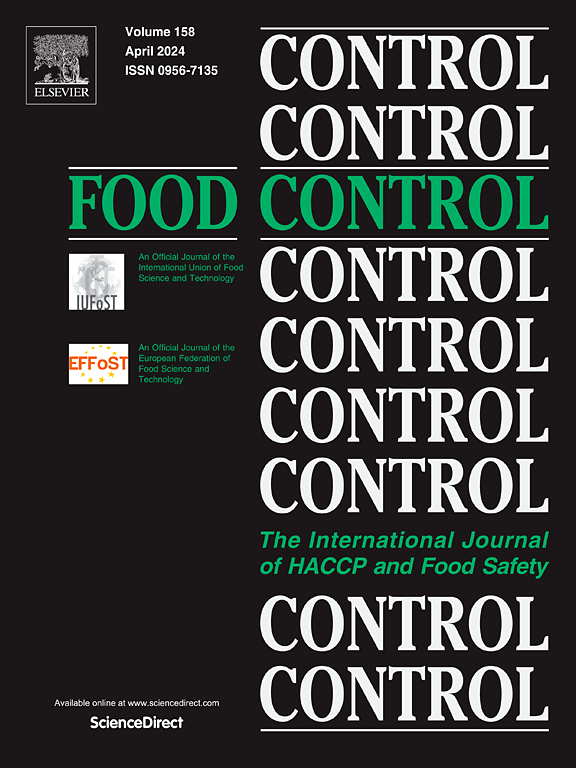纳米技术在精油保护中的应用,延长水果和蔬菜的保质期:综述
IF 5.6
1区 农林科学
Q1 FOOD SCIENCE & TECHNOLOGY
引用次数: 0
摘要
水果和蔬菜在收获、包装、贮藏和运输过程中容易受到酵母菌、霉菌和自然菌群的影响而变质,此外,病原体的存在也会导致食品损失并引发疾病。真菌扩散是水果和蔬菜销售过程中造成经济损失的主要原因。虽然采后病害控制通常使用合成杀真菌剂,但这些杀真菌剂会导致真菌产生抗药性、环境污染和潜在的健康影响。消费者对减少化学品使用的需求日益增长,这激发了人们对植物精油等天然替代品的兴趣,植物精油以其生物活性、抗真菌和抗菌特性以及低毒性、安全性和低成本而著称。本综述旨在通过体外和体内研究,探讨精油在抑制水果和蔬菜中主要腐败微生物和病原微生物方面的功效。本手稿对精油和纳米技术主题进行了文献计量学分析,并综述了精油在纳米乳液、纳米脂质体和纳米材料中的纳米封装及其在水果和蔬菜中的应用,目的是保存或改善水果和蔬菜的质量。此外,本文还讨论了研究和开发从精油中提取的天然杀菌剂所面临的挑战和前景。精油在控制水果和蔬菜中的微生物方面大有可为;然而,它们需要封装以防止降解并实现控制释放。纳米封装技术可增强精油的生物活性,降低剂量,提高稳定性。含有精油的食用涂层可延长保质期,而纳米技术则提供了创新、环保的解决方案。本文章由计算机程序翻译,如有差异,请以英文原文为准。
Applications of nanotechnology in essential oil protection to extend the shelf life of fruits and vegetables: A review
Fruits and vegetables are susceptible to spoilage caused by yeast, mold, and natural flora during harvesting, packaging, storage, and transportation, in addition to the presence of pathogens, which lead to food losses and cause diseases. Fungal proliferation is a major cause of economic losses during the marketing of fruits and vegetables. While postharvest disease control is typically done with synthetic fungicides, these can lead to fungal resistance, environmental pollution, and potential health implications. Growing consumer demand to reduce chemical use has spurred interest in natural alternatives like plant-derived essential oils, known for their bioactive, antifungal, and antibacterial properties, as well as their low toxicity, safety, and low cost. The objective of this review is to investigate the efficacy of essential oils in inhibiting the main spoilage and pathogenic microorganisms found in fruits and vegetables through in vitro and in vivo studies. This manuscript presents a bibliometric analysis on the topics of essential oil and nanotechnology, together with a review of the nanoencapsulation of essential oils in nanoemulsion, nanoliposomes, and nanomaterials and their applications in fruits and vegetables with the aim of preserving or improving their quality. Additionally, this paper discusses the challenges and perspectives in the research and development of natural fungicides derived from essential oils. Essential oils are promising for controlling microorganisms in fruits and vegetables; however, they require encapsulation to prevent degradation and allow controlled release. Nanoencapsulation enhances their bioactivity, enabling lower doses and greater stability. Edible coatings with essential oils extend shelf life, and nanotechnology offers innovative, eco-friendly solutions.
求助全文
通过发布文献求助,成功后即可免费获取论文全文。
去求助
来源期刊

Food Control
工程技术-食品科技
CiteScore
12.20
自引率
6.70%
发文量
758
审稿时长
33 days
期刊介绍:
Food Control is an international journal that provides essential information for those involved in food safety and process control.
Food Control covers the below areas that relate to food process control or to food safety of human foods:
• Microbial food safety and antimicrobial systems
• Mycotoxins
• Hazard analysis, HACCP and food safety objectives
• Risk assessment, including microbial and chemical hazards
• Quality assurance
• Good manufacturing practices
• Food process systems design and control
• Food Packaging technology and materials in contact with foods
• Rapid methods of analysis and detection, including sensor technology
• Codes of practice, legislation and international harmonization
• Consumer issues
• Education, training and research needs.
The scope of Food Control is comprehensive and includes original research papers, authoritative reviews, short communications, comment articles that report on new developments in food control, and position papers.
 求助内容:
求助内容: 应助结果提醒方式:
应助结果提醒方式:


